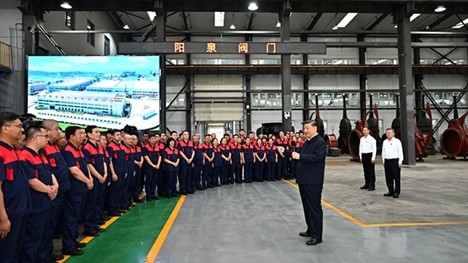Divergent schools of thought in China are speculating on the continuing stability of Xi Jinping as supreme leader. Some suggest there is a growing power struggle amongst the top leadership in the Chinese Communist Party (CCP). They point to the recent announcement of new regulations for influential decision-making and coordinating organizations, as a clear indicator of how the communist leader intends to implement policy changes. They point to his vertical control over the systems. Others disagree, interpreting the changes as an attempt by senior CCP leaders to constrain Xi.
“If the regulations are an attempt to bind Xi to formal mechanisms, the move to institutionalize the organizations through which he has driven the Party-state system could signal that other parts of the leadership are wresting some power from Xi and forcing him to abide by bureaucratic procedure,” notes analysts from the Jamestown Foundation. If he remains the paramount leader, the newly codified rules could signal tighter state control. It would aid Xi in effectively giving him more time to drive his agenda forward while also providing more formal authority to Cai Qi, who is effectively Xi’s chief of staff. Currently, Cai is first-ranked secretary of the Secretariat, fifth-ranking member of the CCP Politburo Standing Committee, and director of the CCP General Office.
Xinhua, the New China New Agency, reported on June 30 that the Politburo reviewed “Regulations on the Work of the Party Central Committee’s Decision-Making, Deliberative, and Coordinating Institutions” (党中央决策议事协调机构工作条例). The wording coming out of the meeting, as relayed by Xinhua, suggests that these regulations were already in place internally and were only being amended or being drafted for a later release date. Analysts in Washington point out that this is important due to the signal it sends about Xi’s hold on power.
The picture remains contradictory and evolving with one side positing that Xi is in trouble and engaged in a struggle to retain power, and the other claiming that he is simply implementing a system to execute his specific policy ambitions. Earlier this year China Briefs, published by the Jamestown Foundation, argued that the West needs to take these changes seriously as “anomalies continue to arise in personnel decisions and purges that seem to be targeting Xi’s people or destabilizing bureaucratic leadership….” Honorifics in CCP official documents play a core role in signaling the power and position of senior leaders. In the most recent readout, honorifics were absent from references to Xi or to his thoughts. Of particular note is that the meeting summary called for leaders to “avoid taking over others’ functions or overstepping boundaries” (不代替、到位不越位). Depending on the perspective, this is said to critique Xi’s overbearing leadership or from a different angle, show his personal concern with the execution of party policy. For those suggesting Xi is in trouble, they note that the readout was unusually brief, did not call for following Xi, and instead suggested the CCP stay away from personalistic styles of leadership.
“The substance of the June 30 meeting was unusual—and not just because it provided the first mention of regulations for decision-making, deliberative, and coordinating institutions. The context for the regulations is a national meeting of the CCP’s secretaries-general that was held in April and hosted by Cai Qi. Cai is a member of the Politburo Standing Committee and director of the Central Committee General Office—the first person to hold both roles simultaneously since the Mao era. The meeting focused on coordination and political discipline across the general offices, heralding further institutionalization of one-man rule,” notes a Jamestown Foundation report. It called for “model agencies” of loyalty and responsiveness and for cadre to serve as “political gatekeepers.” Much of the language is reminiscent of the Maoist era’s frontline mechanism of ideological supervision and political enforcement.
Xi created or changed a number of organizations over the last decade, including the Central Foreign Affairs Commission, the Central Financial and Economic Affairs Commission, and the Central Cyberspace Affairs Commission, giving him more central authority. Of the ten organizations undergoing reform, Xi heads five of them.
Is Xi Jinping acquiring or losing power? It depends on who one talks to lately. Many says Xi remains at the Party’s core, reforming the system to align with his goals under a “centralized and unified leadership” (集中统一领导) and “top-level design” (顶层设计). Others suggest he is losing power organizationally and now ideologically, with analysts pointing to Cai Qi’s amassing of his own power base. They argue the omission of Xi Jinping as providing the CCP’s guiding ideology is indicative of his waning influence. If Xi’s position is more constrained other evidence should begin to appear, such as his being forced to adhere more closely to Party procedures rather than operating on his own. The clearest signal is likely to emerge from the fourth plenary session of the Central Committee, scheduled for later this year.
Daria Novak served in the U.S. State Department
Photo: Xi addresses factory workers (China Govt. photo)
